The Hunchback Assignments by Arthur Slade
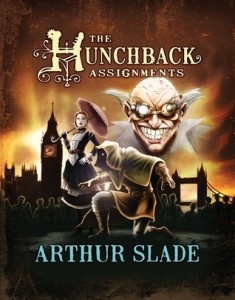 Summary: Sold to gypsies as a baby, Modo is rescued from his life as an attraction in a freak show by Mr. Socrates. With a hump on his back and a disfigured face, Modo’s looks are shocking to others, but he possesses a special ability to transform his appearance for brief periods of time. Trained from childhood with strength and stealth skills, Modo finds himself abandoned in London by Mr. Socrates after a lifetime of seclusion to prove himself. When a girl named Octavia comes into Modo’s life, they stumble upon the Clockwork Guild’s nefarious efforts to create a mind control serum. Unsure of the Guild’s ultimate objectives for the serum, Modo and Octavia follow the clues they encounter under Mr. Socrates’ guidance, only to realise the truth is more sinister than they could have ever imagined.
Summary: Sold to gypsies as a baby, Modo is rescued from his life as an attraction in a freak show by Mr. Socrates. With a hump on his back and a disfigured face, Modo’s looks are shocking to others, but he possesses a special ability to transform his appearance for brief periods of time. Trained from childhood with strength and stealth skills, Modo finds himself abandoned in London by Mr. Socrates after a lifetime of seclusion to prove himself. When a girl named Octavia comes into Modo’s life, they stumble upon the Clockwork Guild’s nefarious efforts to create a mind control serum. Unsure of the Guild’s ultimate objectives for the serum, Modo and Octavia follow the clues they encounter under Mr. Socrates’ guidance, only to realise the truth is more sinister than they could have ever imagined.
Number of Pages: 275
Age Range: 12-14
Review: Kind-hearted and taught to expect fear and rejection, Modo is a sensitive character with honourable intentions and a desire to protect those weaker than he is. Octavia, as an orphan taken under Mr. Socrates’ wing to be one of his spies, has similar characteristics for different reasons. Together, they make a great team, sussing out the Clockwork Guild’s evil intentions and ignoring the orders of those in power to save the innocents. The Hunchback Assignments is an epic steampunk storyline, and epically told by author Arthur Slade.
I loved all of the non-evil characters. Modo for his quietly heroic nature, Octavia for her steadfast determination in life, Mr. Socrates for recognizing the potential in Modo instead of writing him off as a freak, Tharpa’s skilled instruction and obvious care for his students, Mrs. Finchley for her role as Modo’s surrogate and loving mother. I cried for Oscar and Oppie because neither one of them deserved what happened to them at the hands of Dr. Hyde. Because I feel so invested in them, I am eager to read the rest of Slade’s Hunchback series.
Acknowledging that the following paragraph is conjecture on my part, when it came to Modo wondering if Mr. Socrates truly cared about him or just viewed him as one of his spies, I knew that Modo never needed to doubt Mr. Socrates’ affections. Why? Because Modo’s story is an offshoot of Quasimodo, the hunchback of Notre Dame’s story, only while Quasimodo was treated as something less than human by Claude Frollo, Modo is at least respected by Mr. Socrates. I know that because Mr. Socrates names him Modo, which Slade tells his reader means ‘formed,’ a reference to his belief that Modo is a person and complete despite his appearance. In comparison, Quasimodo then means ‘partially formed,’ clearly showing Frollo’s attitudes toward Quasimodo in his name choice.
Slade’s story is a page-turner, the action is well-paced and will keep readers on the edge of their seats hoping everything works out once the true horror of the Clockwork Guild’s intentions are revealed. It’s a book with deeply disturbing aspects, causing it to be appropriately cross-labelled as steampunk, thriller and horror all at the same time.
I quite enjoyed the themes of science versus Mother Nature and the contrast of Modo’s obvious strength and ability against his appearance which is perceived as a deformity. Slade has given me much to think about in terms of what control of mind and body actually means, and also reinforced my beliefs that the mind is a powerful thing. I’m sure Mr. Socrates was trying to prepare Modo for the real world by teaching him never to reveal his true face, but I also felt certain that Octavia could have handled it and cared about him anyway. Although that part could be more of a series teaser than a genuine mistrust on Modo’s part.
I haven’t read a bad steampunk book yet on my Marathon of Books, but The Hunchback Assignments is at the top of my favourite steampunk list. I’d recommend it for early teen readers.
Memorable Quotes:
“‘This is for science,’ he explained tenderly. ‘Science. Mother Nature’s design has failed you, but mine will not.'” – Hyde from The Hunchback Assignments by Arthur Slade, page 2
“‘But I remember my past, young sahib. That is why I do not cringe when I see you. Your disfiguration, it is not your true self.'” – Tharpa talking to Modo from The Hunchback Assignments by Arthur Slade, page 31
“The carriage rattled on. Oscar was bewildered: he was a rider both in the carriage and in his own body. No matter how many times he commanded his hands to open the door or his mouth to call out, nothing happened. His heartbeat was regular and he wasn’t sweating; the panic he felt was all in his head.” – Oscar from The Hunchback Assignments by Arthur Slade, page 137
The Hunchback Assignments by Arthur Slade, is published by HarperCollins Publishers, (2009).
Lost For Words by Alice Kuipers
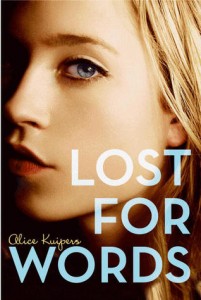 Summary: Dealing with the aftermath of her sister Emily’s death in a terrorist attack in London, England, Sophie is overcome with sorrow, grief, and some guilt. She’s seeing a therapist she can’t talk to, distancing herself from her former friends and her mother and having panic attacks. Writing in a journal given to her by her therapist helps, but it takes a long time before Sophie can face the painful memories of that fateful day and start to move past them. Thankfully she has some friends old and new who won’t give up on her, giving Sophie the support she needs to decide to make changes in her coping methods and a dose of reality.
Summary: Dealing with the aftermath of her sister Emily’s death in a terrorist attack in London, England, Sophie is overcome with sorrow, grief, and some guilt. She’s seeing a therapist she can’t talk to, distancing herself from her former friends and her mother and having panic attacks. Writing in a journal given to her by her therapist helps, but it takes a long time before Sophie can face the painful memories of that fateful day and start to move past them. Thankfully she has some friends old and new who won’t give up on her, giving Sophie the support she needs to decide to make changes in her coping methods and a dose of reality.
Number of Pages: 210
Age Range: 14-16
Review: Sophie’s story is a heartfelt tale about coping with loss. There were so many moments I love in the book, such as Sophie journeying back to her childhood home in an attempt to hold on to her memories of when everything was perfect and the distraction she seeks with Dan to mixed results. The dynamic between Sophie and her mother is especially powerful, because Sophie reserves all her anger for her mother who seems to simply be trying to reach out. It takes some time before Sophie realises this, and in the process there is more anger as she feels her mother is moving on prematurely. Sophie’s mother doesn’t give up on her though, and ends up taking on some of the anger Sophie has for herself for her own actions.
I also love the theme of writing in Lost for Words. Sophie’s poetry and journal writing prove to be a kind of bloodletting for her, helping her get the feelings and memories that are hurting her out and onto the page. It is really the journal writing that sparks the changes in Sophie, as she is finally able to sort things out and examine them. She’s a very introspective character, and her grief journey is a thoughtful one.
Also, the sub-plot of students’ reactions to Kalila, a Muslim girl, in the aftermath of the terrorist attacks was intriguing. I was glad Kuipers wrote Sophie as someone who knew who to blame for the attacks and didn’t waste her time spreading hate against innocents who happened to be following the same religion.
This is a story with two titles and two covers. While originally published as The Worst Thing She Ever Did, it was re-titled Lost for Words and the colour of the girl’s eye on the cover went from brown to blue. I liked the changes, because when I read Kuipers’ book the first time back in 2009, my main focus was on finding out what the worst thing Sophie ever did was. But it turns out to be the worst thing Emily did, and it’s not a bad thing at all, just a piece of extremely bad luck. Lost for Words gives a more accurate idea of what the book is about, Sophie’s experience with overwhelming grief and guilt over her sister’s death. Also, I can’t find out for sure, but is that actress Charlotte Sullivan on the cover?
Once again, Kuipers’ writing is filled with beautiful prose and poignant, powerful moments. Without the suspense restriction of yesterday, I had a lot more memorable quotes for Sophie’s story. By the end of the book I was reluctant for it to end and to let Sophie go as a character because her tale was heartbreakingly honest, but I was confident that she was going to be okay. Changed forever of course, yet still able to go on.
Memorable Quotes:
“I went to Rosa-Leigh’s house. When we arrived her stepmum gave us a cup of tea, and we chatted with her for a few minutes. Andrew was at a playdate, so she wasn’t running around after him. She said, ‘I remember when I was your age and the whole world felt like it was opening up to me. It was -‘ Her phone rang, so she didn’t finish the sentence.
If there had been time, I’d have told her the world wasn’t opening up, rather closing like a flower when the sun goes down. I’d have said the world sometimes feels completely closed, like Emily’s bedroom door.” – Sophie from Lost for Words by Alice Kuipers, page 76
“I woke up, and I was having my period. I hate periods. They just seem the most stupid, pointless thing for someone who’s sixteen. I don’t want to get pregnant (not that there’s any chance of that, even if I did want to). No sixteen-year-old in the universe wants to get pregnant, so WHY do we have periods? Some girls start when they’re ten. Why does a ten-year-old need to have a period? Mine is so irregular I can never predict it, which is a nightmare.” – Sophie from Lost for Words by Alice Kuipers, page 85
“Later we sat on the beach for the final moments of the day. We both loved sunsets. The sun melted into the sea. The light bounced off the water, making the surface of the ocean look like the scales of a fish. I wondered aloud what it would be like to be a mermaid.” – Sophie from Lost for Words by Alice Kuipers, page 88
“If I was sure there was a God, I’d have this to say to Him right now: ‘STOP MESSING EVERYTHING UP FOR EVERYONE!'” – Sophie from Lost for Words by Alice Kuipers, page 110
“Mark continues to get much better from his heart attack, although apparently he’s very shaken. Adults say that a lot: ‘Shaken.’ It doesn’t seem the right word to me to describe how you feel after something bad’s happened. Shaken is how you feel when you’ve been on a roller-coaster, all lively and buzzing. Shaken is how Mark felt when he swam in the lake that night, I’m sure. I could see in his eyes how he was all shaken up inside, happy, excited. When something bad’s happened, you feel numb, like it’s not real. You feel dead on the inside. Not shaken at all.” – Sophie from Lost for Words by Alice Kuipers, page 139
“God, I wish I could go back to the night I was sitting with Emily on the roof. I wish I could hold time still at that moment and never move forward. I wish I could be there forever.” – Sophie from Lost for Words by Alice Kuipers, page 173
“Emily
The windows failed
I could not see
to see
Hold on to her tightly
She’s generous
(an orange leaf)
Hugeness shut quietly
I suddenly couldn’t breathe
(take deep breaths)
If only
I could go back
if only it would make sense
I held her hand
watched the sun go down
Briefly
When I was finished, I looked up and light streaked the sky in fingers of pink and blue. Then, as I was watching, the sun glimmered over the roofs of the houses and appeared in a fireball of molten orange. I blinked. For a moment I could have sworn Emily was sitting right there next to me.” – Sophie writing a poem about her sister Emily from Lost for Words by Alice Kuipers, pages 208-209
Lost for Words (originally published as The Worst Thing She Ever Did) by Alice Kuipers, is published by HarperTrophy Canada, (2009).
The Death of Us by Alice Kuipers
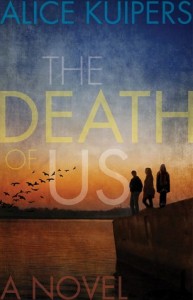 Summary: When a car accident leaves the lives of best friends Callie and Ivy in jeopardy, Kurt and his friend Xander rush to the hospital to find out their fates. As the background of the story behind the accident slowly unravels from three different perspectives, the complicated nature of Callie and Ivy’s friendship reveals itself. Callie seems to be the only one who is happy about Ivy’s return to town, but their connection causes problems with Callie’s parents as her mom forbids Callie to see her. Drawn to Ivy’s electric nature, Callie ventures down a road of self-discovery with unforeseen and permanent consequences for herself and others.
Summary: When a car accident leaves the lives of best friends Callie and Ivy in jeopardy, Kurt and his friend Xander rush to the hospital to find out their fates. As the background of the story behind the accident slowly unravels from three different perspectives, the complicated nature of Callie and Ivy’s friendship reveals itself. Callie seems to be the only one who is happy about Ivy’s return to town, but their connection causes problems with Callie’s parents as her mom forbids Callie to see her. Drawn to Ivy’s electric nature, Callie ventures down a road of self-discovery with unforeseen and permanent consequences for herself and others.
Number of Pages: 220
Age Range: 15-17
Review: Exploring themes of identity, friendship, trust and self-esteem, The Death of Us by Alice Kuipers is a suspenseful tale presented from the perspectives of three different characters moving back and forth from before and after the accident. Kuipers is kind to her readers and clearly labels her time periods and perspectives, and as a result her choice of narration ends up being unique and multifaceted instead of cumbersome.
Suspense is a delicate story tool. Too little and a reader’s interest can lag, too much and a reader can become frustrated. Kuipers, however, wields it with considerable skill, keeping her reader on the hook and wanting more. By beginning the story with the accident, my interest was immediately piqued, and by the time I had learned how exactly everything came about, who was involved and who survived, I was involved in the characters’ lives and felt the true impact of the situation.
I only have three memorable quotes because with a story like this it is very important not to accidentally reveal key surprise plot points. Instead I picked the first as a telling character description, the second as simply a vivid and beautiful piece of writing, and the third as a life truth I could relate to.
While the mystery of who, if anyone, will survive the accident is the driving force of the story, I loved the aspect of Callie coming into her own and gaining the confidence to be herself in who she loves and in what she writes. Kuipers writes Callie’s parents as people who genuinely seek her best interests, which ends up being a stark contrast to Ivy’s mother and Kurt’s birth mother. Callie herself is a genuine character in the process of learning from her mistakes. I liked the sub-plot about Rebecca being hurt and miffed as Callie’s best friend when Ivy comes back to town, because Callie’s obsession with Ivy is all-consuming and others can see it.
Ivy is complex and complicated. Lacking support from her mother who drinks and deals with depression, she’s desperately searching for something to hold on to and get her through. But that keeps changing. After her break up with Diego, she turns to motivational videos, Callie, alcohol and Kurt, rotating through her crutches without dealing with the real issues of being abandoned by her father and having a suicidal mother. I felt for her because she was trying so hard to keep up her façade of having everything under control. She’s magnetic and sparkles with life, and it’s easy to see why others are attracted to her.
But my favourite character ends up being Kurt. A year older than the rest, he’s had his share of trouble in life with his father dying of cancer and his birth mother turning to substance abuse to cope. He’s a thoughtful character, and Kuipers shows this by writing a particularly poignant scene shared by Kurt and his mother wherein Kurt sees his potential future staring back at him and decides to make a different decision.
If you pick up The Death of Us, make sure you have some time because you’ll need some serious willpower to not read it all in one sitting. Also, keep the tissues handy – you’ll need them.
Memorable Quotes:
“My mom is all about keeping children children for as long as possible. Her books are described as charming, innocent, whimsical.” – Callie describing her mother who works as a children’s book illustrator from The Death of Us by Alice Kuipers, page 43
“I cross the street under the overhang of leaves that arch from huge, old trees. A cat startles and yowls, scurrying for cover as I had past the first couple of stores that begin yuppified Pine Hill Street, which is full of cafés, bars, restaurants, yoga studios and expensive clothing stores.” – Callie from The Death of Us by Alice Kuipers, page 55
“There’s no way to explain to most people, people like Callie or Xander, that life can be so bad sometimes the only way to deal with it is to pretend none of it’s happening. Or, the opposite. Life can be so good, the possibility of the future so awesome that the only way to protect yourself from ruining it is to sit back. Let the opportunity slide by.” – Kurt from The Death of Us by Alice Kuipers, page 124
The Death of Us by Alice Kuipers, is published by HarperTrophy Canada, (2014).
Apart by R.P. MacIntyre and Wendy MacIntyre
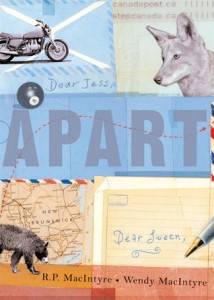 Summary: An ad in the personal section of The Globe and Mail Newspaper connects two strangers from opposite ends of Canada. James, known as Sween, and Jessica begin a friendly correspondence with letters delivered back and forth between Saskatchewan and New Brunswick by Canada Post, gradually getting to know each other and finding connection across the kilometres. Writing proves to be different than in person contact though, and when Sween and Jessica finally meet, both feel a bit duped by unrealistic expectations. Deciding to cling to the world they created through their letters, Sween and Jessica are changed, but can’t maintain what they once had.
Summary: An ad in the personal section of The Globe and Mail Newspaper connects two strangers from opposite ends of Canada. James, known as Sween, and Jessica begin a friendly correspondence with letters delivered back and forth between Saskatchewan and New Brunswick by Canada Post, gradually getting to know each other and finding connection across the kilometres. Writing proves to be different than in person contact though, and when Sween and Jessica finally meet, both feel a bit duped by unrealistic expectations. Deciding to cling to the world they created through their letters, Sween and Jessica are changed, but can’t maintain what they once had.
Number of Pages: 176
Age Range: 15-17
Review: Told exclusively through the letters exchanged between Sween and Jessica, Apart by R.P. MacIntyre and Wendy MacIntyre unfolds in spurts of action and reflective writing. As a reader I tend to assume characters are honest unless it is obvious they aren’t, and I loved the exploration of how we represent ourselves to people we haven’t met in person. Things got a little choppy in the end, but the MacIntyres managed to convey everything was not as it seemed, and what appeared to be a strong connection between Sween and Jessica kind of disintegrated in the harsh light of reality.
In some ways, I’m a little confused about what was being accurately represented and what wasn’t, but I was touched by Jessica’s relationship with her brother Timmy. She was always there for him to take care of him and protect him from harm, and was ultimately willing to give up her dreams for him. I don’t think that was a misrepresentation, and if Gunner hadn’t stepped in with his own plans for Timmy, I believe Jessica would have done her best to look after him on her own.
Which plunges other aspects of the book into doubt. Was Gunner really the villain then? Surely he was quite self-involved, but after Sween meets him he comes off better somehow. Not so selfish, and perhaps willing to do what Jessica is not for her greater good. It might just be a matter of perspective.
Either way, both Sween and Jessica were talented writers capable of moulding to suit their needs, and with all they were both dealing with, I’m not sure complete honesty was the most important thing. Despite what was real and what wasn’t, they managed to find connection and support to help them deal with lackluster parenting, mental health diagnoses, the death of pets and complicated sibling relationships. Their friendship served a purpose but also had a shelf life, reminding me that not all stories have the ending you might want them to.
Memorable Quotes:
“And here’s one of Great-Grandma’s sayings I really love, and that helps keep me going. ‘You have to dree your weird, child,’ she tells me. That means you have to endure your fate. And I have quite a lot of fate to endure.” – Jessica from Apart by R.P. MacIntyre and Wendy MacIntyre, page 31
“But the thing is, I just let him do it. I let him dig his hand in and really hurt me. Because sometimes it seems like that pain is something I deserve, or that I need to have done to me.
Let’s make a pact not to hurt ourselves like this any more. Because it seems to me that when you use the dog clippers on yourself when you’re depressed, that’s what you’re doing. It just makes my stomach clench to think of you buzzing your scalp and scraping yourself nearly bald. So no more of this kind of stuff. Okay by you?” – Jessica from Apart by R.P. MacIntyre and Wendy MacIntyre, page 59
“Maybe sex makes me uncomfortable because it’s so much in our faces all the time, and because of the way it’s presented with people in way-too-tight clothes and a lot of cheap vulgar jokes. I don’t see much of the kind of sexual love I imagine has to exist somewhere with kindness and caring and a gentle touch at the heart of it. I’m not seeing that anywhere at all really.” – Jessica from Apart by R.P. MacIntyre and Wendy MacIntyre, pages 75-76
“Gladys calls you The Writer because she sees what your destiny is. And maybe this is the reason for all your trials now. Maybe this is the ‘dark night of the soul’ every good writer has to go through in order to be perceptive and empathetic and honest. Or maybe you think I am being a super extraordinary romantic fool for thinking this way?” – Jessica from Apart by J.P. MacIntyre and Wendy MacIntyre, page 91
Apart by R.P. MacIntyre & Wendy MacIntyre, is published by Groundwood Books, (2007).
Daughter of Strangers by Marjory Gordon
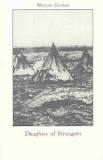 Summary: In the Northwest Territories with her adoptive parents and brother on an archaeological dig, Amy unexpectedly travels back in time, finding herself with the Dene people. Appearing with a herd of caribou, Amy is thought to be able to summon them, and is welcomed into the tribe as a result. After initially trying to escape, Amy quickly learns the ways of the Dene people, forming relationships and watching the months pass by. Just as Amy has given up on ever returning home, deciding to agree to get married, the caribou appear once more and carry her away – taking her back to her own time only four days later forever changed and with a lot of explaining to do.
Summary: In the Northwest Territories with her adoptive parents and brother on an archaeological dig, Amy unexpectedly travels back in time, finding herself with the Dene people. Appearing with a herd of caribou, Amy is thought to be able to summon them, and is welcomed into the tribe as a result. After initially trying to escape, Amy quickly learns the ways of the Dene people, forming relationships and watching the months pass by. Just as Amy has given up on ever returning home, deciding to agree to get married, the caribou appear once more and carry her away – taking her back to her own time only four days later forever changed and with a lot of explaining to do.
Number of Pages: 144
Age Range: 14-16
Review: A slow but well-paced read, Daughter of Strangers by Marjory Gordon is best described as an anthropological study of the Dene people who lived 1600 years before present day. Amy’s character is the perfect observer of their beliefs and practices, but still allows her personal beliefs to drive her actions when she feels it is necessary.
Gordon brings out the Dene people’s belief in connectedness and their ability to use all resources available to them to live off the land. As an adopted daughter, Amy’s biological parents have Native roots, and living with the Dene people gives her a chance to explore that part of herself. Her relationship with Setsuna, a grandmother in the tribe, is especially healing when it comes to the rift she feels inside over her parents giving her up. Reading about Setsuna’s gradual demise was heart-rending, though I enjoyed seeing how Amy stayed true to her convictions about family even in light of the tribes’ beliefs.
But my favourite part was when Amy is reunited with her family. In her view she’s been living with the Dene people for three months, and in her family’s view she has been gone for only four days. Amy has a wild haircut and has picked up the habits of the Dene people, wiping her fingers in her hair and teaching her brother how to kill squirrels to eat. I laughed out loud at her parents’ horrified reactions to their new, ‘wild’ girl and loved that her brother immediately believed her story.
Daughter of Strangers is not a reluctant read, but it is quite informative and has a lot of heart. Amy’s unexpected journey matures her and also gives her some spunk. She definitely has gained huge amounts of respect and awe in the eyes of her brother, and I wonder how her changes will play out when she moves back south.
I had quite a few memorable quotes, and I hope you enjoy them as much as I did.
Memorable Quotes:
“A few days ago, Amy’s dad had found a long, tapered lance point in Amy’s backdirt and she’d mixed a diamond-shaped, stemmed lance point from the Middle Taltheilei level in with a small side-notched arrowhead from Late Taltheilei. Her dad had lectured, but had held back on how upset he was. Nonetheless, she had struck back, shouting at him, ‘I don’t belong with this family.’ He had told her what he had said many times before, that he and Mom had chosen her because they wanted her.
Once, she had used the part about being chosen when she was angry at Bob for following her around when she wanted to play with her girlfriends. She had blurted out, ‘Mom and Dad chose me, but they had to take you.'” – Amy using the explanation of her adoption against her brother from Daughter of Strangers by Marjory Gordon, pages 36-37
“‘She is prettier than Thanaltha, My Older Brother, for her eyes tell everything that she feels. Her heart shines through her eyes like sunlight through the water of a pond.'” – Naiti from Daughter of Strangers by Marjory Gordon, page 41
“The stars were a thread, binding her to those she loved. She sensed her mom and dad and brother through time and distance but that was not enough. How she wished her mom could hold her, or her family sit beside her instead of this strange Indian boy, who every now and then lifted his head and wailed his pain. But time was a space surely as the land and sky that surrounded them. Like the sky, it was a space she could not cross on her own.” – Amy from Daughter of Strangers by Marjory Gordon, page 113
“They did not sleep, but sat until the small flame between them faded to glowing coals. The only thing either of them had said all night was about the sky and yet it was like they had talked for hours. No, it was more like they had listened and heard and understood. They had swallowed each other’s sadness, two bodies with one full heart.” – from Daughter of Strangers by Marjory Gordon, page 114
“The fish were pleased. Hook and line held. Amy pulled a grayling onto shore. In spite of the sweet taste of the fish, she had to will herself to sit up to eat it. She was like a motor whose fuel had run out so completely that it was no longer primed to start. She forced herself to chew slowly, to get every bit of juice from the meat.” – Amy from Daughter of Strangers by Marjory Gordon, page 130
Daughter of Strangers by Marjory Gordon, is published by Oberon Press, (2001).
Whiteout by James Houston
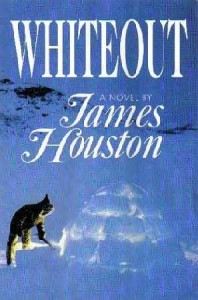 Summary: Banished to Baffin Island to live with his Uncle Calvin when he needs to complete a year of community service for a drug charge, Jon’s motivation to stay in line is unlocking the trust fund his dad left for him to inherit when he turns 20. To do that, he needs the approval of both his mother and his uncle, and their collective opinion of him is quite low since his trouble. Living in the Inuit community of Nanuvik, Jon adapts well, throwing himself into his work as a music teacher at the local school and making friends along the way. As he grows to love his new life and falls for a local girl named Panee, Jon must decide whether to pursue his dreams of becoming a composer by going to school in the south, or give them up for love.
Summary: Banished to Baffin Island to live with his Uncle Calvin when he needs to complete a year of community service for a drug charge, Jon’s motivation to stay in line is unlocking the trust fund his dad left for him to inherit when he turns 20. To do that, he needs the approval of both his mother and his uncle, and their collective opinion of him is quite low since his trouble. Living in the Inuit community of Nanuvik, Jon adapts well, throwing himself into his work as a music teacher at the local school and making friends along the way. As he grows to love his new life and falls for a local girl named Panee, Jon must decide whether to pursue his dreams of becoming a composer by going to school in the south, or give them up for love.
Number of Pages: 175
Age Range: 15-17
Review: Not only is Whiteout by James Houston an interesting and moving story about seventeen year-old Jon as he gains direction in his life, but it is also a fascinating look at life in a Hudson Bay Company outpost and Inuit community. As a result, I find myself liking it best for its historical aspects.
Still, there are other parts to love as well. Houston has a vivid writing style that visually captures the North for his reader. I loved his description of Panee and Pudlo building an igloo when they went on their fishing trip especially, because I could see it in my mind. I learned more about snow blindness and the changing weather conditions up North, and even though Houston didn’t directly address it as Farley Mowat does in his writing, it is clear through his story that the land and nature should be properly feared and respected.
Jon falls in love with what was then the Northwest Territories, and living there changes him. I personally didn’t need the love story part to see that, but it still worked, although I was bothered a bit by Panee seeming to be reduced to a commodity as she is the only eligible mate for Kudlik.
Whiteout is a excellent story of character growth with elements of adventure. When I was finished I was happy Jon had found people that cared about him and a place to belong, although I wish somehow the ending could have been different.
Memorable Quotes:
“‘I want to tell you something, Jon. These Inuit live very different lives than we do. They’ve come from a different place, a different age. I believe they’ve the kindest, most poeaceful people in the world. But still, they can easily break your heart without even knowing that they’re doing it.'” – Calvin from Whiteout by James Houston, page 75
“It was well past midnight when the feasting began. Small children who had been fast asleep awoke and wanted to dance again, and Paneee’s grandmother, with her eyes half closed, once more played her accordion for them. As the night went on and the participants whirled round and round, they seemed to become a single family, dancing, dancing in the square of light as though they were the only people on earth.” – from Whiteout by James Houston, page 89
The Whiteout by James Houston, is published by Greey de Pencier Books, (1988).




 Amy Mathers has been passionate about reading from a very young age, and hopes others will share her enthusiasm for funding a teen book award.
Amy Mathers has been passionate about reading from a very young age, and hopes others will share her enthusiasm for funding a teen book award. 





